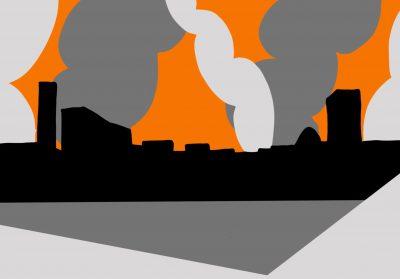Op-Eds do not reflect the editorial opinion of The Daily Free Press. They are solely the opinion of the author(s).
Andrea Wetzler (CAS ’23), Gillian Minarik (CAS’23), Emma Roth (CFA ’22) are members of the organization Divest BU.
On Sept. 23, 2021, after nearly a decade of student activism, President Brown announced the BU Board of Trustees’ decision to divest from the fossil fuel industry. We at Divest BU celebrate this step in fighting the climate crisis and are grateful to the students, staff, faculty members and organizers who have supported the campaign thus far.

That said, the fight against fossil fuels on campus is not over. President Brown’s email outlined a shift in climate policy to reduce BU’s fossil fuel exposure, but it was vague and ignored demands for reinvestment into community structures and further community care.
In response, we present three demands: an expedited timeline for divestment, more transparency and the creation of a social impact fund. These steps are necessary for the realization of BU’s commitment, and for the University to acknowledge the harm inflicted through their long-term fossil fuel investments.
We need an expedited timeline because the climate crisis is not a distant future: it is here in the form of heat waves and fires, floods and droughts. Though the email mentions this urgency, its failure to provide a concrete timeline contradicts this acknowledgment. Therefore, we ask: If this was such an “important decision,” why didn’t it happen sooner?
Brown cites the 2021 Intergovernmental Panel on Climate Change report as “establishing more definitively” this urgency, but the IPCC has made the climate crisis clear for decades. Brown’s quoting of the IPCC fails to acknowledge not only the scientific history, but — more importantly — the lived experience of climate change and continued calls for action by largely Black, Indigenous and low-income communities in the United States.
We are also forced to ask: If we have “less than a decade” to “make significant reductions in fossil fuel use,” why does the divestment process require a decade to liquidate investments? Is this merely an attempt to deflect and pacify the current student population until a new generation arrives? With the current vague timeline, the BU administration could hypothetically extend this deadline forever and never implement meaningful change.
To be blunt: we do not have time for this.
As BU attempts to feign leadership at this moment, we also question their financial opacity. Brown states that a “very small fraction of our endowment is invested in fossil fuel producers,” retroactively trying to justify BU’s prolonged decision. We know that BU’s endowment is massive, according to financial statements released by the University itself. Yet their unwillingness to share the financial portfolio keeps us from knowing just how “inconsequential” that sum is. If it is so ‘unimportant,’ why does the University portray itself as a leader in the face of climate chaos? Why deny us access to the real numbers?
On that note, it is ironic that BU’s idea of “transparency” means sharing information with a committee whose membership remains undisclosed. The email’s promise to “ensure transparency” is laughable at best and sinister at worst. Considering DivestBU’s decade-long struggle to demand more transparency on BU’s fossil fuel investments, it is distressing to witness this same pattern of opacity within President Brown’s email.
For what reasons does the Board of Trustees bar the larger BU community from viewing the full investment policy? Who actually comprises the Investment Office, and why are these proposed annual reports available to only a select part of the BU community? Why isn’t this public knowledge?
If the University aims to be on the ‘right side of history,’ they must also acknowledge the harm they have inflicted and hold themselves accountable. We recommend establishing two funds: a Green Economies Fund, based on the funds divested from the fossil fuels industry, and a Social Impact Fund, equal to 1% of the total previous fossil fuel holdings.
A Green Economies Fund would redirect the divested funds into projects to build a more sustainable economy and facilitate a just transition from fossil fuels. BU must dedicate itself to pro-union industries supporting this framework. These sectors include but are not limited to: energy efficiency, green energy, sustainable agriculture, green transportation and infrastructure and sustainable management of freshwater resources.
The Social Impact Fund must take profits from the Green Economics Fund to reinvest in our community. This fund must support environmental justice work, including but not limited to: businesses generally excluded from established sources of capital, affordable housing projects, public and publicly-owned infrastructure and community-owned energy.
All endeavors should align with BU’s values of forging strong community connections, adapting to the needs of its students, anti-racism and social justice leadership.
BU has taken far too long to come to this decision: for decades, they have invested in the harm of environmental injustice. We will not forget their complicity and failures. We must hold them accountable to addressing their harm. They must respond to our demands, as well as the demands of organizations like the CAS Anti Racist Initiative, School of Theatre Anti-Racist Student Initiative, Uprooted & Rising and BU Students for Justice in Palestine. We look forward to seeing their action. Until then, we look forward to seeing you all in the streets — because we know our demands must be pushed.
















































































































